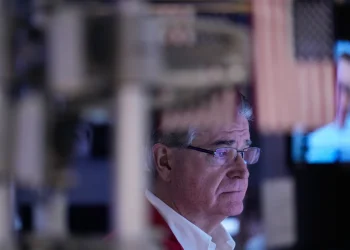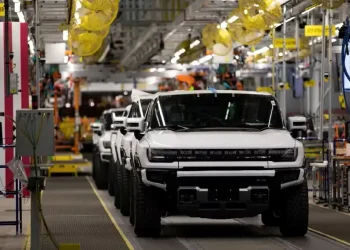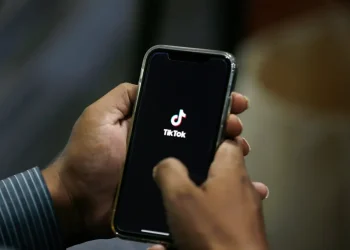Trump Threatens Apple With 25% Tariff Over iPhone Production Outside the U.S.
President Donald Trump issued a sharp warning to Apple on Friday: if the tech giant doesn’t manufacture its iPhones in the United States, it will face a hefty 25% tariff.
Trump took to Truth Social early Friday morning to demand that Apple CEO Tim Cook ensure iPhones sold in the U.S. are made domestically. He wrote, “I have long ago informed Tim Cook of Apple that I expect their iPhones sold in the United States to be made in the U.S., not India or anywhere else. If not, a tariff of at least 25% must be paid by Apple.”
This move comes after Trump expressed frustration last week during his Middle East trip over Apple’s plans to build iPhones for the U.S. market at new factories in India. Apple has been shifting some production outside China as part of a diversification strategy, with India playing an increasing role.
On Apple’s recent earnings call, Cook acknowledged that most iPhones sold in the U.S. will soon be labeled “Made in India.” He also noted Apple expects to face tariff costs of up to $900 million this quarter due to these changes, though Trump exempted electronics from some of his earlier, heavier tariffs on Chinese goods.
Currently, about 90% of iPhone production happens in China, according to Wedbush Securities. Despite tariffs being reduced recently from as high as 145% on Chinese imports to around 30%, a 10% tariff still applies broadly to goods entering the U.S.
During his Middle East trip, Trump publicly challenged Cook over Apple’s overseas plans. “I had a little problem with Tim Cook,” Trump said in Qatar. “I told him, ‘You’re my friend. I treated you very well. You’re bringing in $500 billion. But I don’t want you building iPhones in India.’”
Cook and Trump met again at the White House earlier this week, though the topics of their conversation were not disclosed.
U.S. Treasury Secretary Scott Bessent weighed in Friday, highlighting the administration’s goal to bring advanced manufacturing back to America, particularly in critical areas like semiconductors. “Apple uses many semiconductor components, and we want them to help secure our supply chains,” Bessent told Fox News.
Apple already sources some chips from the U.S., thanks to its partnership with Taiwan Semiconductor Manufacturing Company (TSMC), which recently opened a chip plant in Arizona.
Why Apple Says U.S. iPhone Production Is Difficult
Despite being the most valuable company in the world, Apple has long argued it cannot fully manufacture iPhones in the U.S.
The company invests billions training engineers abroad, where large talent pools in China and India allow them to hire skilled workers at lower costs. Apple’s late co-founder Steve Jobs once told President Obama that the U.S. lacks enough industrial engineers to support large-scale manufacturing.
“You can’t find that many engineers in America to hire,” Jobs said in 2010. “If you could educate them, we could bring manufacturing back here.”
Tim Cook echoed this view in 2012, saying he hopes Apple can eventually produce more products domestically but that it would take significant effort and influence.
Experts Call U.S. iPhone Production “Unrealistic”
Industry analysts say shifting iPhone manufacturing back to the U.S. is not realistic in the near term.
Dan Ives, head of technology research at Wedbush Securities, called the idea a “fairy tale” and said the costs would skyrocket. He explained that replicating the complex Asian supply chain in America could cause iPhones to cost over $3,500—more than triple the current $1,000 price.
Ives estimated that even moving just 10% of Apple’s supply chain to the U.S. could take three years and cost about $30 billion. Fully relocating production might take five to ten years, if possible at all.
What a 25% Tariff Could Mean for Consumers
If Trump follows through with the tariff, iPhone prices in the U.S. could rise, further burdening American buyers. Rumors are already swirling that Apple may raise prices when launching its new iPhone models this fall, though the company is likely to avoid blaming tariffs directly.
Apple’s U.S. Investment Efforts
While full iPhone production in the U.S. may be out of reach, Apple has announced a $500 billion investment to expand operations stateside. This includes building a new data center in Houston to support Apple’s growing AI products, increasing data center capacity across several states, and investing in corporate offices and Apple TV+ production facilities nationwide.
Summary:
President Trump has demanded Apple manufacture iPhones in the U.S. or face a 25% tariff, citing national security and job creation goals. Apple, however, argues that current economic and workforce realities make full domestic production impossible. Experts agree the costs and timelines for reshoring production would be enormous, and tariffs could raise consumer prices. Meanwhile, Apple continues to invest heavily in U.S. facilities in other areas.
This article was rewritten by JournosNews.com based on verified reporting from trusted sources. The content has been independently reviewed, fact-checked, and edited for accuracy, neutrality, tone, and global readability in accordance with Google News and AdSense standards.
All opinions, quotes, or statements from contributors, experts, or sourced organizations do not necessarily reflect the views of JournosNews.com. JournosNews.com maintains full editorial independence from any external funders, sponsors, or organizations.
Stay informed with JournosNews.com — your trusted source for verified global reporting and in-depth analysis. Follow us on Google News, BlueSky, and X for real-time updates.














